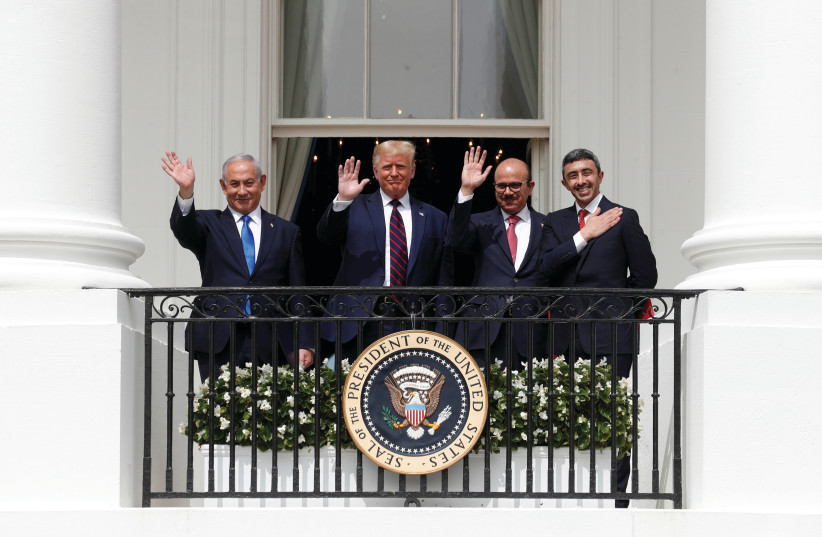It was a moment that changed the course of history. On the bright, sunlit morning of September 15, 2020, when Abdullah bin Zayed al-Nahyan, foreign minister of the UAE; Israel’s prime minister Benjamin Netanyahu; and Abdullatif bin Rashid al-Zayani, foreign minister of Bahrain, held aloft signed copies of the Abraham Accords in front of the White House, it signaled not simply the end of 48 years of hostility and distrust but the beginning of a new political and economic era for our region.
In establishing full diplomatic relations, the UAE, Bahrain and Israel had chosen prosperity over politics, cooperation over isolation, opportunity over suspicion. Everyone present on the South Lawn understood the magnitude of the occasion – and its potential to elevate the lives of people across the Middle East in the decades to come.
How have Israel-UAE relations progressed?
Two years have now passed since that day, and it is clear that the scale and rapidity of progress in UAE-Israel relations have surpassed even the most optimistic expectations. We have witnessed exponential growth in trade, research and development, academic partnerships and intra-government cooperation in areas from taxation to tourism and aviation. Since the signing of the accords, the value of bilateral trade has exceeded $3b., while trade in the first half of 2022 has now outstripped the $1.3b. recorded in the whole of 2021.
We have been particularly encouraged by joint ventures in emerging sectors, with billions of dollars now committed to developing new solutions to pressing global challenges such as water security and renewable energy. This is perhaps best evidenced by the landmark tripartite agreement that will finance a solar plant in Jordan to generate electricity for export to Israel, which will in turn supply Jordan, one of the most water-poor countries in the world, with 200 million cu.m. of desalinated water. This is an area of clear regional benefit and also global significance.
There has also been collaboration in advanced technology and the industries of the future, demonstrating the power of knowledge sharing in bringing artificial intelligence, machine learning, nanotechnology and the Internet of Things into mainstream use. For instance, the UAE-Israel Tech Zone was launched in December 2020 to connect more than 1,000 investors, technology leaders, government officials, and developers, and Abu Dhabi’s Group 42 and Rafael Advanced Defense Systems and have joined forces to create Presight.AI, a research and development center to unearth AI solutions for banking, healthcare and public safety.

The success of the UAE-Israel relationship was such that, in late 2021, we agreed to pursue a new multi-level trade deal designed to unlock even greater benefits for our businesses, entrepreneurs and innovators. The UAE-Israel Comprehensive Economic Partnership Agreement (CEPA) was signed on May 31 and is set to come into force in the coming weeks, reducing or eliminating tariffs on 96% of product lines, removing unnecessary trade barriers, opening market access in key service sectors such as tourism, financial services, distribution and transport, and creating new opportunities in growth industries such as healthcare, agri-tech and advanced technology.
By creating a platform for cooperation in all areas, including the public sector, the private sector and academia, we are projecting that this deal, once ratified, will push the value of non-oil trade between the UAE and Israel beyond $10b. by 2028.
We must fully embrace the opportunities granted through the Abraham Accords
IT IS, THOUGH, important that we fully embrace the opportunity in front of us. Neither the benefits of the Abraham Accords nor the growth projected by the CEPA are inevitable; it will require continuous effort and perhaps an element of courage to stride across the bridge that has now been built. Any business relationship is built on trust, respect and open dialogue, and while we understand that those don’t materialize overnight, our investment communities must move with greater purpose and confidence to ensure the Abraham Accords become a genuine catalyst for growth.
Rest assured, the UAE remains committed to the shared future we have created; as nations, we face many of the same challenges, from water and food security to energy transition, but we are also pursuing many of the same goals, including the development of knowledge and innovation-based economies that fully integrate the tools of the fourth industrial revolution. I am, then, confident that before we mark the third anniversary of diplomatic ties, we will see more projects proposed, more ventures launched and more wealth created – and we will support any entity, any institution, that wishes to accelerate economic activity between us.
Over the past two years, the UAE and Israel have demonstrated what can be achieved when we cast aside our divisions and differences. The Abraham Accords laid strong foundations for a new era of prosperity, progress and peace for our people and for those right across the region and, amid the disruptions of the global pandemic and rising energy costs, added stability and a sense of optimism to the geopolitical landscape.
I would like to thank my counterparts in Israel, in particular Economy Minister Orna Barbivay, for their dedication to, and enthusiasm for, this new partnership It is with a profound sense of hope for the Middle East that I look forward to continuing this journey together.
The writer is the UAE minister of state for foreign trade.
